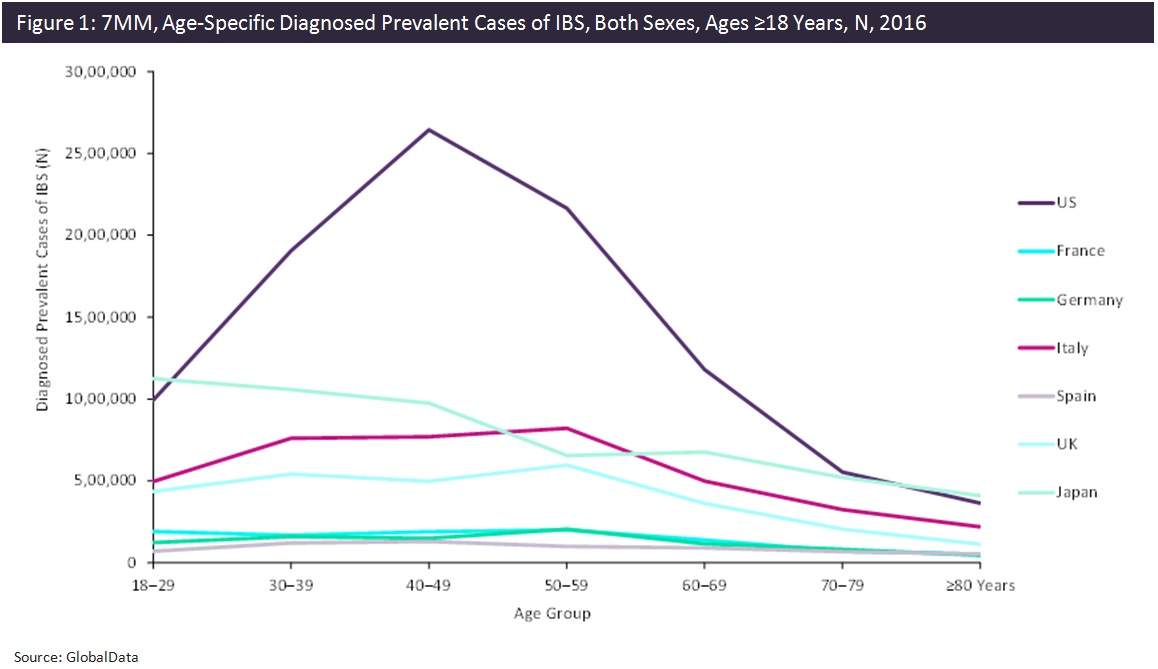
Irritable bowel syndrome (IBS) is a chronic, relapsing gastrointestinal (GI) disorder that is characterised by abdominal discomfort or pain, bloating, and changes in bowel habit. Due to the lack of a demonstrable structural abnormality to explain these symptoms, IBS is classified as a functional GI disorder. IBS is predominant in younger and middle age adults and gradually declines with increasing age of the population.
GlobalData epidemiologists forecast that the diagnosed prevalent cases of IBS in the seven major markets (7MM: US, France, Germany, Italy, Spain, UK, and Japan) will increase from 24,414,879 cases in 2016 to 25,163,675 cases in 2026, at an Annual Growth Rate (AGR) of 0.31% per year. In the five major European markets (5EU: France, Germany, Italy, Spain, and UK), the diagnosed prevalent cases of IBS will increase from 9,184,511 cases in 2016 to 9,371,952 cases in 2026, at an AGR of 0.20%.
In 2016, adults ages 40–49 years made up the highest proportion (21.94%) of diagnosed prevalent cases of IBS, followed by adults ages 30–39 years (19.32%) in the 7MM. Adults ages 80 years and older accounted for the fewest diagnosed prevalent cases of IBS (5.17%) in the 7MM. The US had a strong trend of increase in diagnosed prevalent cases of IBS until ages 40–49 years, followed by strong trend of decrease in diagnosed prevalent cases. The 5EU countries showed a slight increase in diagnosed IBS cases until ages 50–59 years, followed by slight decline in cases. Figure 1 presents the diagnosed prevalent cases of IBS in the 7MM in 2016 and 2026.
The exact cause of IBS is unknown, but experts believe increased sensitivity of the gut and problems digesting food as possible factors. There are currently no medications or surgical procedures that can cure IBS. Treatment goals include managing symptoms, maintaining remission, and preventing relapse. Experts suggest that dietary changes, reducing stress, and exercise are beneficial in managing symptoms of IBS. The findings from the forecast by GlobalData epidemiologists are that most of IBS occurrence is in adults ages between 40–49 years followed by 30–39 years. As adults in these age groups are more at risk of developing IBS, treatment priorities should be aligned to address this imbalance. Population at risk should be monitored provide best adequate treatment including measures to alleviate symptoms and prevent severe flare-up of the disease.
How well do you really know your competitors?
Access the most comprehensive Company Profiles on the market, powered by GlobalData. Save hours of research. Gain competitive edge.

Thank you!
Your download email will arrive shortly
Not ready to buy yet? Download a free sample
We are confident about the unique quality of our Company Profiles. However, we want you to make the most beneficial decision for your business, so we offer a free sample that you can download by submitting the below form
By GlobalData







Related Company Profiles
IBS N.V.